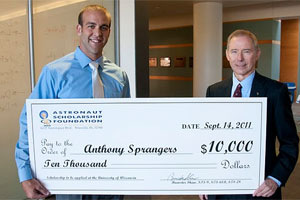
Senior Anthony Sprangers, the first UW-Madison recipient of an Astronaut Scholarship Foundation scholarship, receives his check from astronaut and College of Engineering alumnus, Brewster Shaw.
Brewster Shaw(’68 BS, ’69 MS EGR) has logged 533 hours of space flight on three Space Shuttle missions, twice as mission commander. He also flew 644 hours of combat in F-100 and F-4 aircraft. In total, he has more than 5,000 hours flying time in about 30 types of aircraft. After 27 years, he retired from the United States Air Force as a colonel. Brewster Shaw has a few stories to tell.
And this is exactly what he did on Wednesday, September 14, when he returned to his alma mater to present the Astronaut Scholarship Foundation (ASF) scholarship to Anthony Sprangers, a senior majoring in biomedical engineering. This is the first ASF scholarship awarded at the University of Wisconsin-Madison.
Speaking in Engineering Hall on the College of Engineering campus, Shaw, who studied engineering mechanics as a student in the 1960s, shared stories about his experiences as a combat fighter pilot, test pilot, astronaut and deputy director of Space Shuttle Operations at the Kennedy Space Center. Shaw recently retired from the Boeing Company as vice president and general manager, Space Exploration, for Integrated Defense Systems. He was responsible for the strategic direction of Boeing’s civil space programs and support of NASA programs such as the Space Shuttle; International Space Station; Checkout, Assembly & Payload Processing Services; Constallation and Ares. Shaw was inducted into the U.S. Astronaut Hall of Fame in 2006 and serves on the Astronaut Scholarship Foundation’s Board of Directors.
More than 80 astronauts are helping the United States retain its world leadership in science and technology by providing scholarships for college students who exhibit motivation, imagination and exceptional performance in the science or engineering field of their major.
The Astronaut Scholarship Foundation was established originally in 1984 as the Mercury Seven Foundation by the six surviving members of America’s original Mercury Seven astronauts, Mrs. Betty Grissom (widow of the seventh, Virgil “Gus” Grissom), William Douglas, M.D. (the Project Mercury flight surgeon), and Henri Landwirth, an Orlando businessman and friend of the astronauts. The founding astronauts were Malcolm Scott Carpenter, L. Gordon Cooper Jr., John H. Glenn Jr., Walter M. Schirra, Alan B. Shepard Jr. and Donald K. (Deke) Slayton.
The original Mercury Seven Foundation began on a shoestring budget, and the first seven scholarships, at $1,000 each, were awarded in 1986. As more money was raised the amount and number of scholarships increased gradually. The foundation now awards 26 scholarships annually, each worth $10,000, for a total of $260,000. To date, the foundation has awarded over $3 million in scholarships to deserving students nationwide.
Students may not directly apply for the scholarship but are nominated by faculty members. Nominees must be U.S. citizens studying engineering or natural or applied science, e.g. astronomy, biology, chemistry, physics, earth science, computer science or mathematics students with intentions to pursue research or advance their field upon completion of their final degrees. Students intending to pursue a practice in professional medicine are not eligible for the scholarship. However, those intending to perform biomedical research are eligible. At the time of nomination, scholarship candidates must be at least second-year (sophomore) students, have excellent grades, and have participated in lab and research work in their field. Scholarship nominees must show initiative, creativity and excellence in their chosen field. Special consideration is not given to aeronautical/astronautical engineering students or those intending to pursue careers as astronauts.
For more information
 Listen as Brewster Shaw describes the excitement of taking off in the Space Shuttle, after a short nap right before liftoff, and the thrill of space exploration. Shaw is optimistic about future investment in our space program. Hear why in his own words.
Listen as Brewster Shaw describes the excitement of taking off in the Space Shuttle, after a short nap right before liftoff, and the thrill of space exploration. Shaw is optimistic about future investment in our space program. Hear why in his own words.
